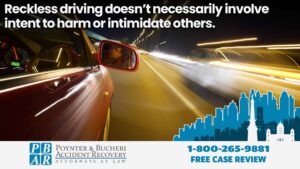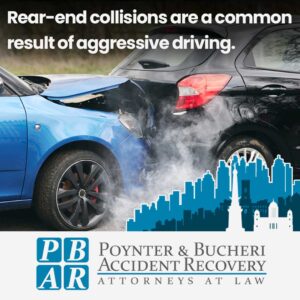
If you’ve been injured in a car accident caused by aggressive driving, you may be entitled to compensation. While many accidents result from driver error or distracted driving, aggressive driving goes a step further. It involves intentional, dangerous behavior behind the wheel, such as tailgating, weaving through traffic, or speeding to intimidate. These actions often lead to serious injuries and complex personal injury claims; an Indianapolis aggressive driving accident attorney can help.
At Poynter & Bucheri, our experienced Indianapolis car accident lawyers understand the impact these collisions can have on your life. Our car accident lawyers offer a free case evaluation to help you explore your legal options and pursue the justice you deserve.
Contact our law firm today at 800-265-9881 or click here to schedule your free consultation today!
How Aggressive Driving is Defined in Indiana
In Indiana, aggressive driving is more than reckless—it’s a criminal offense. Under Indiana Code § 9-21-8-55, a driver may be charged if they commit three or more dangerous actions during a single episode of driving. These include:
- Following too closely
- Unsafe operation
- Passing off the roadway
- Impeding traffic
- Unnecessary horn use
- Failing to yield
- Running red lights or stop signs
- Speeding
- Flashing headlights repeatedly
These actions often lead to serious traffic collisions, including pedestrian accidents, resulting in long-term injuries and the need for extensive medical treatment.
What sets this apart from standard traffic violations is intent. The driver must be acting in a manner that harasses, intimidates, or threatens others. Aggressive driving is a Class A misdemeanor, punishable by up to one year in jail, a fine of up to $5,000, and loss of license points.
If you’ve been hurt in an Indianapolis car accident, contact an Indianapolis car accident lawyer at Poynter & Bucheri today to discuss your personal injury lawsuit and pursue the justice you deserve.
Are Aggressive and Reckless Driving the Same Thing?
Aggressive and reckless driving are closely related traffic offenses under Indiana law, but they are legally distinct. Understanding the difference can significantly impact the outcome of an insurance claim or personal injury case. Both can lead to serious auto accidents and carry consequences such as civil liability and criminal penalties.
Aggressive Driving
Under Indiana law, aggressive driving involves committing three or more traffic violations—such as tailgating, speeding, or failing to yield—during a single, continuous episode. These actions are intentional and often meant to harass, intimidate, or provoke others on the road.
Unlike simple errors, this behavior is confrontational and dangerous. If an aggressive driver causes a crash, victims may have grounds to file a personal injury lawsuit for medical care, pain and suffering, and emotional distress.
If you’ve been hit by an aggressive driver, don’t count on your own insurance company to cover it all. Contact an experienced Indianapolis car accident attorney at Poynter & Bucheri for help with your Indiana car accident case.
Reckless Driving

Reckless driving doesn’t necessarily involve intent to harm or intimidate others. It is defined more broadly as operating a vehicle with willful or wanton disregard for the safety of people or property. This may include excessively speeding, ignoring traffic control devices, passing in no-passing zones, or other careless and dangerous behaviors.
Unlike aggressive driving, reckless driving is typically rooted in carelessness or a disregard for consequences, even if no direct confrontation occurs. However, the legal and financial consequences can be just as severe.
If you’ve been injured due to someone’s reckless driving, you may file an insurance claim as part of your Indiana personal injury case. This can help you recover compensation for medical bills, lost wages, and property damage.
Don’t let a reckless driver’s negligence go unanswered. Contact an experienced Indianapolis car accident lawyer at Poynter & Bucheri to discuss your options under Indiana personal injury law.
Understanding the Difference
The key difference is intent—aggressive driving is deliberate and confrontational, while reckless driving shows disregard for safety without intending harm.
In some cases, a driver’s actions may meet both definitions. Law enforcement and insurance companies will review the facts to determine liability and the amount of compensation that may be owed.
Having an experienced Indiana personal injury attorney by your side can make all the difference. Contact a car accident attorney at Poynter & Bucheri Law Firm today to protect your rights and maximize payout.
What Causes Someone To Drive Aggressively

Aggressive driving often results from stress, frustration, or road conditions. While occasional irritation is normal, certain situations can trigger dangerous behavior that increases the risk of an automobile accident.
Common causes include:
- Stress and pressure
- Emotional carryover
- Distracted driving
- Environmental triggers
- Perceived provocation
No matter the cause, aggressive driving puts everyone on the road at risk. If you’ve been injured in a crash caused by an aggressive or negligent driver, you may be entitled to compensation through the at-fault party’s insurance company, your own motorist coverage, or a personal injury lawsuit—depending on the circumstances of the crash.
Contact an experienced Indianapolis car accident attorney at Poynter & Bucheri Law Firm to explore legal services available to you after an automobile accident.
How Aggressive Driving Can Cause Rear-End Car Accidents
Rear-end collisions are a common result of aggressive driving. The following aggressive driving behaviors commonly contribute to rear-end collisions:
- Tailgating (following too closely): When drivers don’t maintain a safe following distance, they reduce the time and space available to react if the vehicle in front stops suddenly.
- Sudden acceleration and braking: Aggressive drivers often accelerate quickly and brake hard. This erratic behavior can catch other drivers off guard, especially those behind them, leading to rear-end collisions.
- Weaving in and out of traffic: Constantly changing lanes and cutting in front of other vehicles disrupts the flow of traffic and often forces drivers to brake unexpectedly, increasing the risk of rear-end collisions.
If you’ve been injured in a rear-end collision, you may have a valid car accident claim. Contact an experienced car accident attorney at Poynter & Bucheri today to seek justice after your rear-end collisions
What You Must Do According to Indiana Law After an Aggressive Driving Accident

Being in an aggressive car accident is overwhelming, but the law requires you to take certain steps immediately. Failing to follow these steps can lead to serious legal consequences, including charges, fines, or a suspended license.
Immediate Actions Required
Under Indiana Code § 9-26-1-1.1, after a car accident you must:
- Stop Immediately: Pull over at the car accident scene or as close as safely possible without blocking traffic.
- Provide Information: Share your name, address, vehicle registration, and driver’s license with all involved parties.
- Assist the Injured: Provide reasonable assistance to anyone who is hurt. This includes calling 911, offering assistance within your ability, and following the instructions of emergency responders.
- If Fatal Injuries Are Present: Do not move the car accident victim unless absolutely necessary for safety. Call 911 immediately, remain at the scene, and wait for law enforcement and medical personnel to arrive. Provide a clear account of what happened and cooperate fully with authorities.
- Notify Authorities: Report the car crash to local law enforcement right away. An accident report is vital for determining fault and dealing with insurance adjusters.
Following these steps ensures compliance with state law. It helps protect your legal rights after a traffic accident, especially when dealing with insurance companies or filing a personal injury claim.
Legal Consequences for Non-Compliance
Failing to take the above steps can lead to serious legal consequences, as the law requires full compliance from all drivers involved in an accident to ensure accountability, protect public safety, and support the proper handling of insurance and legal claims.
These consequences may include:
- Class B Misdemeanor: Leaving the scene without exchanging required information
- Class A Misdemeanor: Failing to stop or assist when bodily injury has occurred
- Level 6 Felony: Leaving the scene of an accident involving serious bodily injury or if the driver has prior offenses
- Level 4 Felony: Leaving the scene of an accident resulting in death or catastrophic injury
Penalties may also include up to one year of license suspension, depending on the offense.
If you’re unsure how to proceed after a serious car crash, don’t wait to seek legal representation. An auto accident attorney at Poynter & Bucheri can help you navigate the legal process and protect your driving privileges.
Insurance and Financial Responsibility
After the crash, your insurance company representative must submit a Certificate of Compliance (COC) to the Indiana BMV, proving you had valid coverage at the time of the car accident. Failing to do so can result in license suspension or other penalties.
Due to the legal and insurance complexities of aggressive driving accidents, it’s wise to speak with an experienced Indianapolis car accident lawyer. A car accident attorney can communicate with the insurance adjustor and guide you through every step of your auto accident claim. The car accident attorney can also ensure all required documentation is submitted correctly and help you pursue full compensation.
Severe Injuries After an Aggressive Driving Accident

Aggressive car accidents typically involve high speeds, sudden stops, and reckless moves—making serious injuries or even wrongful death more likely. Depending on how severe the car accident is, victims may suffer from a variety of injuries, including:
- Traumatic Brain Injuries (TBIs)
- Spinal Cord Injuries
- Broken Bones and Fractures
- Internal Bleeding or Organ Damage
- Whiplash and Soft Tissue Injuries
- Amputations
- Burns
- Permanent Scarring or Disfigurement
Accident victims must seek prompt medical treatment, even if symptoms aren’t immediately obvious. Some serious injuries take time to appear, and documented care is essential for your health and to support your claim. Medical records play a key role in proving the extent of your injuries and the other driver’s fault in a car accident case.
The physical pain and emotional impact of these injuries can disrupt nearly every part of your life. From mounting medical bills and lost income to the mental toll of a long recovery, the aftermath of a car accident can be devastating. Through a personal injury claim, you may pursue compensation for the full range of losses the car accident caused.
Damages You Can Sue the Aggressive Driver’s Insurance Company for
If you were injured in a car accident, Indiana law allows you to seek compensation for your physical, emotional, and financial losses—whether through the at-fault driver’s insurance provider, your own insurance company, or a personal injury lawsuit.
Economic Damages
Economic damages cover the tangible financial costs directly related to the car accident. This typically includes:
- Medical expenses
- Future medical bills
- Lost wages
- Loss of earning capacity
- Property damage
To accurately calculate the full extent of damages from a motor vehicle accident, it’s important to contact an experienced Indianapolis car accident lawyer—especially if you’re self-employed, as determining lost income and future earning capacity in a personal injury case can be more complex.
Non-Economic Damages
In addition to economic losses, Indiana car accident victims may also pursue non-economic damages, which compensate for the emotional and psychological impact of the crash. These may include:
- Pain and suffering
- Mental anguish or anxiety
- Loss of enjoyment of life
- Loss of consortium
Oftentimes, insurance companies refuse or push back on non-economic claims, making it difficult for victims to recover full compensation. That’s why having an experienced car accident lawyer is essential to successfully fighting insurance companies in your car accident case.
Punitive Damages
In rare but serious cases, punitive damages may be awarded—not to compensate the victim but to punish the at-fault driver for reckless or intentional conduct. This can include excessive speeding, road rage, or deliberately forcing another driver off the road. Punitive damages also serve as a warning to others that such behavior will not be tolerated.
An experienced Indianapolis car accident lawyer can help you determine the full value of your car accident claim, gather key evidence, negotiate with the insurance company, and take your case to court if necessary to pursue fair compensation.
Minimum Amounts of Liability Insurance Drivers Must Maintain

In Indiana, all drivers are legally required to carry a minimum amount of liability insurance to operate a vehicle. This coverage helps ensure financial responsibility in the event of a car accident.
The state’s minimum coverage—often called 25/50/25—includes:
- $25,000 for injury or death of one person
- $50,000 for injury or death of two or more people
- $25,000 for property damage
While these are the legal minimums, they may not cover all medical care or repair costs in a serious car accident. Many drivers opt for higher limits for enhanced protection.
Indiana drivers are automatically provided with uninsured and underinsured motorist coverage unless they formally reject it in writing. This coverage is important if you’re hit by a driver who has no insurance or lacks enough to cover your injuries.
Failing to maintain proper coverage can result in fines, license suspension, or vehicle impoundment. To stay compliant and financially protected, make sure your policy meets or exceeds Indiana’s requirements.
What Indiana’s Status as an At-Fault State May Mean for Your Total Recoverable Compensation
Indiana operates under an “at-fault” insurance system, meaning that the driver responsible for causing a car accident is liable for the resulting damages. This system allows injured parties to pursue compensation from the other driver’s insurance company.
Modified Comparative Fault Rule
Indiana follows a modified comparative fault rule, meaning you can recover compensation only if you’re 50% or less at fault for the accident. If you’re 51% or more at fault, you’re barred from recovery. If you’re partially at fault but still under 51%, your compensation is reduced by your percentage of fault. For example, a $100,000 award would be reduced to $70,000 if you’re found 30% at fault.
Because fault affects how much you can recover, you must accurately prove the other party’s responsibility. Insurance companies and courts consider evidence such as police reports and witness statements to determine fault.
Understanding these laws is key to protecting your claim. A skilled attorney can help build a strong case and ensure you pursue fair compensation.
Indiana Aggressive Driving Criminal Penalties
In Indiana, aggressive driving is a criminal offense. A driver may be charged if they commit three or more violations during a single driving episode with the intent to harass, intimidate, or obstruct others.
When proven, aggressive driving is classified as a Class A misdemeanor, punishable by up to one year in jail and fines of up to $5,000.
Additional consequences may include:
- Points on your driver’s license, potentially leading to suspension
- Increased insurance premiums or policy cancellation
- Habitual Traffic Violator status for repeat offenses
If the behavior causes serious bodily injury or a fatal accident, charges may be elevated to a felony, carrying more severe penalties.
Whether you’ve been accused of aggressive driving or are the victim of it, seeking legal representation is crucial to protect yourself and understand your legal options.
How To Protect Yourself and Others From Aggressive Drivers

Aggressive drivers can be dangerous, but how you respond can help prevent an accident. Here are practical ways to stay safe:
- Stay calm and avoid engagement: Don’t make eye contact, react, or try to “teach them a lesson.” Escalating the situation puts everyone at greater risk.
- Create distance: If someone is tailgating or driving aggressively, safely change lanes and let them pass. Give them space.
- Drive defensively: Stay alert, avoid distractions, and anticipate sudden moves. Keep a safe following distance and leave yourself room to maneuver.
- Report dangerous behavior: If the driver is threatening or reckless, safely pull over or ask a passenger to call law enforcement. Share vehicle details, location, and direction of travel.
- Care for your emotional well-being: Feeling shaken is normal. Talk to someone or seek support if these encounters leave you anxious or stressed.
Aggressive driving is unpredictable, but your response doesn’t have to be. Staying calm and focused is the best way to protect yourself and others.
Our Personal Injury Law Firm is Ready to Help
If you’ve been injured due to an aggressive driver, don’t wait to seek help. You may be entitled to financial compensation for your medical treatment, lost wages, and pain and suffering through a personal injury claim. Insurance companies often try to deny claims or downplay the extent of car accident victims’ injuries or pain and suffering. This can cause added financial and emotional strain for those who have suffered due to another’s aggressive driving.
With a proven track record of securing results for victims, the team at Poynter & Bucheri brings experience, dedication, and personal attention to every case.
Call our law firm at 800-265-9881 or click here today to schedule your free consultation with a trusted Indianapolis car accident lawyer.
